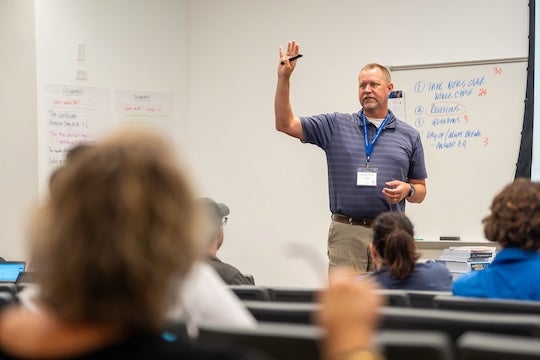
At Rice University’s Advanced Placement Summer Institute (APSI) offered through the Susanne M. Glasscock School of Continuing Studies, educators from across the globe gather each year to strengthen their instruction, build community and prepare students for success in college and beyond.
One of the largest and longest-running university-based AP teacher training programs in the country, Rice’s APSI equips educators with practical tools and strategies to deepen instruction in AP classrooms and open access to rigorous, college-level learning — especially for students historically underrepresented in advanced academics.
This year, the institute’s international footprint stretched across the world with participants hailing from 23 countries, including Afghanistan, Belgium, the Dominican Republic, Egypt, Korea, Mexico, Turkey and Vietnam — in either an in-person or online format.
“It’s all about the kids, and it’s all about the teachers working with one another,” said Carolene Leibl, a veteran AP biology educator and longtime APSI instructor who’s only missed one summer at Rice in the program’s 31-year history. “If I can share anything with these teachers and it helps them, well, that’s what counts.”
Led by College Board-endorsed consultants — many of whom are AP exam readers, national award-winning teachers and test development committee members — Rice’s APSI offers sessions for both new and experienced AP teachers in subjects ranging from biology and calculus to U.S. history and studio art. Consultants say the collaborative spirit and dedication of the participants make the institute stand out.

“The participants are like sponges. They’re really hard-working, good people … it’s a pleasure,” said Matt Johnson, an AP U.S. history consultant from Spokane, Washington. “They actually formed their own Facebook group because of the Summer Institute. That’s the kind of stuff that tells you this works.”
Johnson said the quality of the programming, along with Rice’s culture of hospitality, is what brings him and many others back each year.
“Rice has done better than anybody at engaging the community and opening this up for teachers to really engage in high-level professional development,” he said. “I just really hope I keep getting asked back.”
That level of impact is exactly why Houston Independent School District continues to invest in sending teachers to the institute, said Christinia Wehde-Roddiger, executive director of postsecondary readiness for HISD.
“Having an exemplary teacher in every classroom is our goal, because when teachers learn and practice great pedagogy, students can reach their full potential,” Wehde-Roddiger said.
“Rice University’s AP Summer Institute is a great opportunity for our AP teachers to get professional development that is not only close to home but is well known for providing some of the most engaging and effective AP professional development that can be found anywhere in the country.”
Of the more than 1,500 teachers attending across the three weeks this summer, more than 170 are from HISD.
Wehde-Roddiger said she hopes teachers return to their classrooms with deep familiarity with AP course content and expectations and the tools to help students master college-level material.
“When our teachers develop a deep grasp of the AP courses they are assigned to teach, they become well-equipped to ensure student success,” she said. “This translates into more students excelling on their AP exams and becoming both college and career ready.”
As Leibl puts it, Rice’s APSI is about more than mastering standards — it’s about building lasting support networks and creating ripple effects that touch students, schools and entire communities.
“It’s not a one-way street,” Leibl said. “It’s the interaction with the teachers — how can we make this program better, and what can we do for kids?”
For more information about the AP Summer Institute and Rice’s Center for College Readiness, visit: https://continue.rice.edu/center-college-readiness.

